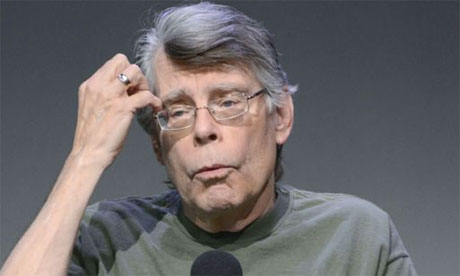As ebooks of King's latest novel circulate online, German researchers pioneer controversial new DRM technology

The Joyland of piracy … Stephen King. Photograph: Everett Collection / Rex Feature
As new, pirated ebooks of Stephen King's print-only new novel Joyland begin to circulate online, researchers in Germany are investigating a new piracy prevention method which could alter a story's text to deter illegal copying.
 Joyland, the coming-of-age story of a college student who works at a fun fair where a murder has been committed, was released earlier this month through small press Hard Case Crime. King said last year that he "loved the paperbacks I grew up with as a kid, and for that reason, we're going to hold off on e-publishing this one for the time being", a move which attracted predictable criticism from readers online, who have given the well-reviewed novel one-star write-ups on Amazon.com without having read it. And despite King's wishes to focus on the paperback, pirated ebook copies are already available online.
Joyland, the coming-of-age story of a college student who works at a fun fair where a murder has been committed, was released earlier this month through small press Hard Case Crime. King said last year that he "loved the paperbacks I grew up with as a kid, and for that reason, we're going to hold off on e-publishing this one for the time being", a move which attracted predictable criticism from readers online, who have given the well-reviewed novel one-star write-ups on Amazon.com without having read it. And despite King's wishes to focus on the paperback, pirated ebook copies are already available online.
Hard Case Crime publisher Charles Ardai was sanguine about the news, saying that "as a publisher, you try to prevent it or to stamp it out when you discover it, but it's like the 'war on drugs' – good luck. Seize a boatload of heroin, and what does it get you? There are more boats, there's more heroin."
He told US publishing website GalleyCat that even if an official ebook edition had been released, it would most likely have been pirated as well, and "in the end you have to rely on the good behaviour of the vast majority of the audience".
"I see no reason to think that pirates represent more than a small fraction of all consumers," said Ardai. "That doesn't mean we don't care about piracy – we do. But it's just one of the many punches you have to learn to roll with in the rough-and-tumble world of modern publishing."
At Germany's Fraunhofer Institut, meanwhile, researchers are looking into new protection measures for ebooks. The new ebook digital rights management (DRM) system would, reported PaidContent, change certain words in the text of a pirated ebook – "invisible" could become "not visible", for example, and "unhealthy" become "not healthy" – so that an individualised copy could be traced.
According to the institute's Dr Martin Steinebach, the initiative, called SiDiM, which is backed by a subsidiary of the German Publishers & Booksellers Association, has been greeted with scepticism, "not so much from the publishers but from the authors".
"Naturally they fear that their elaborate writing will be scrambled by automatic replacements," he said, stressing that the technology was still under evaluation. "In general publishers tend to be quite open to watermarking," he continued. "Our current solution for ebooks is based on image watermarking of illustrations, and we got a lot of publishers embracing this as an alternative to hard DRM."
One of the authors who has reacted warily to the news is Lloyd Shepherd, who wrote about his online encounter with someone who pirated his novel The English Monster last year.
"It requires material changes to be made to the text in order for it to work," he said. "Given how authors will tussle with copy-editors day and night over the difference between a comma and a semi-colon, I can see that being quite a problem."
"It may even run into problems with intellectual property," he added, "as I'm guessing the author would need to grant a licence to the publisher to make changes to the text – presumably without checking each one first – without recourse to the author. I can't even imagine how you'd word that in a contract."
Shepherd also wondered how "another method of identifying piracy" would help the books industry, given that users on sites such as Mobilism – where last year he found someone offering a reward for anyone prepared to produce a free ebook version of The English Monster – "are openly encouraging each other to acts of piracy, and publishers seem basically unable to stop it".
More
 Joyland, the coming-of-age story of a college student who works at a fun fair where a murder has been committed, was released earlier this month through small press Hard Case Crime. King said last year that he "loved the paperbacks I grew up with as a kid, and for that reason, we're going to hold off on e-publishing this one for the time being", a move which attracted predictable criticism from readers online, who have given the well-reviewed novel one-star write-ups on Amazon.com without having read it. And despite King's wishes to focus on the paperback, pirated ebook copies are already available online.
Joyland, the coming-of-age story of a college student who works at a fun fair where a murder has been committed, was released earlier this month through small press Hard Case Crime. King said last year that he "loved the paperbacks I grew up with as a kid, and for that reason, we're going to hold off on e-publishing this one for the time being", a move which attracted predictable criticism from readers online, who have given the well-reviewed novel one-star write-ups on Amazon.com without having read it. And despite King's wishes to focus on the paperback, pirated ebook copies are already available online.Hard Case Crime publisher Charles Ardai was sanguine about the news, saying that "as a publisher, you try to prevent it or to stamp it out when you discover it, but it's like the 'war on drugs' – good luck. Seize a boatload of heroin, and what does it get you? There are more boats, there's more heroin."
He told US publishing website GalleyCat that even if an official ebook edition had been released, it would most likely have been pirated as well, and "in the end you have to rely on the good behaviour of the vast majority of the audience".
"I see no reason to think that pirates represent more than a small fraction of all consumers," said Ardai. "That doesn't mean we don't care about piracy – we do. But it's just one of the many punches you have to learn to roll with in the rough-and-tumble world of modern publishing."
At Germany's Fraunhofer Institut, meanwhile, researchers are looking into new protection measures for ebooks. The new ebook digital rights management (DRM) system would, reported PaidContent, change certain words in the text of a pirated ebook – "invisible" could become "not visible", for example, and "unhealthy" become "not healthy" – so that an individualised copy could be traced.
According to the institute's Dr Martin Steinebach, the initiative, called SiDiM, which is backed by a subsidiary of the German Publishers & Booksellers Association, has been greeted with scepticism, "not so much from the publishers but from the authors".
"Naturally they fear that their elaborate writing will be scrambled by automatic replacements," he said, stressing that the technology was still under evaluation. "In general publishers tend to be quite open to watermarking," he continued. "Our current solution for ebooks is based on image watermarking of illustrations, and we got a lot of publishers embracing this as an alternative to hard DRM."
One of the authors who has reacted warily to the news is Lloyd Shepherd, who wrote about his online encounter with someone who pirated his novel The English Monster last year.
"It requires material changes to be made to the text in order for it to work," he said. "Given how authors will tussle with copy-editors day and night over the difference between a comma and a semi-colon, I can see that being quite a problem."
"It may even run into problems with intellectual property," he added, "as I'm guessing the author would need to grant a licence to the publisher to make changes to the text – presumably without checking each one first – without recourse to the author. I can't even imagine how you'd word that in a contract."
Shepherd also wondered how "another method of identifying piracy" would help the books industry, given that users on sites such as Mobilism – where last year he found someone offering a reward for anyone prepared to produce a free ebook version of The English Monster – "are openly encouraging each other to acts of piracy, and publishers seem basically unable to stop it".
More
No comments:
Post a Comment